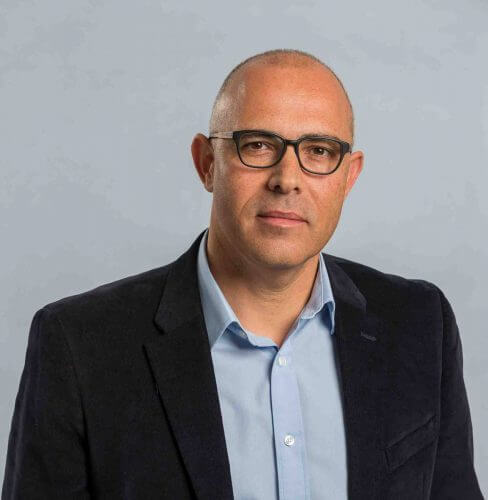Prof. Chen is a neuroscientist, head of the neurobiology department at the Weizmann Institute of Science, and heads the Max Planck Institute for Psychiatry in Munich, Germany. In addition, he is also the head of the joint laboratory of the Max Planck Institute and the Weizmann Institute of Science for experimental neuropsychiatry and behavioral neurogenetics and an adjunct professor at the medical school of the Ludwig Maximilian University in Munich.

The Board of Directors of the Weizmann Institute of Science, headed by Shimshon Harel, elected Prof. Alon Chen as the 11th president of the Weizmann Institute of Science. The council hereby accepted the recommendation of the search committee, headed by the chairman of the international council of the institute, Prof. Yehuda Reinhartz, who examined several candidates for the position, and recommended - unanimously - to choose Prof. Chen.
Prof. Chen will begin serving in his position on December 1, 2019, upon the end of the term of the current president, Prof. Daniel Zeifman, who has been in office since 2006.
Prof. Chen is a neuroscientist, head of the neurobiology department at the Weizmann Institute of Science, and heads the Max Planck Institute for Psychiatry in Munich, Germany. In addition, he is also the head of the joint laboratory of the Max Planck Institute and the Weizmann Institute of Science for experimental neuropsychiatry and behavioral neurogenetics and an adjunct professor at the medical school of the Ludwig Maximilian University in Munich.
Prof. Chen, born in Israel (1970), received a bachelor's degree in life sciences, with honors, from Ben-Gurion University of the Negev, in 1995, and a PhD in a direct track at the Weizmann Institute of Science in 2001 (with honors). At the same time, he also received a master's degree in business administration (MBA) from Ben-Gurion University of the Negev. Between the years 2005-2001, after winning the Rothschild and Fulbright scholarships, he carried out post-doctoral research at the Salk Institute for Biological Research in California, where he began to investigate brain processes that control stress and anxiety states. In 2005 he returned to the Weizmann Institute of Science as a senior researcher in the neurobiology department, and was awarded the "Alon" scholarship; The most prestigious Israeli scholarship for returning scientists. In 2012 he was promoted to the rank of associate professor, and in 2017 to the rank of professor.
I thank the members of the committee for selecting the president, the board of directors of the Weizmann Institute of Science, the institute's scientists, its employees and friends for the opportunity given to me to lead this leading scientific institution to new heights of excellence and scientific and educational achievements."
In 2013 he was appointed director and researcher at the Max Planck Institute for Psychiatry and the head of the joint laboratory of the Max Planck Institute and the Weizmann Institute of Science for experimental neuropsychiatry and behavioral neurogenetics.
Prof. Chen's research focuses on biological processes involved in the development of mental stress and anxiety; and in the mechanisms by which the brain responds to the challenges associated with these mental states; including the question of how these reaction mechanisms are related to psychiatric disorders. The goal of these studies is an accurate mapping of the pathways in which mental states are processed in the brain and "translated" into biological reactions, which manifests itself, at the end of the chain, in physiological and behavioral changes. Comparing these pathways, in healthy and sick states, may lead to the development of new and effective treatment methods.
Prof. Chen, the members of his research group and his research partners, deciphered basic aspects of the way in which animals and humans react to mental stress and anxiety, and discovered genes, proteins and brain circuits directly related to these phenomena. In addition, they also discovered epigenetic mechanisms (which affect the expression of genes, not the genes themselves); and information processing circuits in the brain related to anxiety disorders, depression, eating disorders and metabolic syndrome.
In his current positions, as director of the Department of Neurobiology at the Weizmann Institute of Science and as director of the Max Planck Institute for Psychiatry, Prof. Chen has gained extensive experience in management in general, and in scientific management in particular. This experience includes, among other things, managing large budgets, raising resources, working together with scientific councils, boards of directors, elected officials, scientific and administrative staff, alumni, donors and the community.
Prof. Chen is known for his ability to describe complex scientific processes in a language equal to every soul, for the good human relations he instills around him, for his leadership skills and his ability to identify opportunities and "translate" challenges into innovative solutions. He also invests time and effort in scientific education and making science accessible to the general public.
Prof. Chen is married and has two children.
After his election, Prof. Chen addressed the members of the international council, the members of the board of directors, the institute's scientists, its employees and friends: "I thank the members of the committee for selecting the president, the board of directors of the Weizmann Institute of Science, the institute's scientists, its employees and friends for the opportunity given to me to lead the institute This scientific leader to new heights of excellence and scientific and educational achievements".
